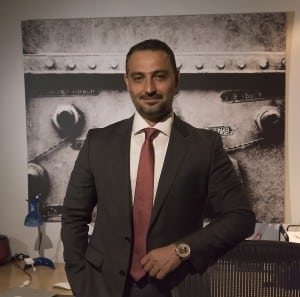SkyStream Diversifies Business, Considering European Opportunity
[Via Satellite 07-24-2015] Middle East satellite service provider SkyStream is diversifying its business to include new verticals and a new role as a systems integrator. Services such as managing military networks and building teleports have added to the company’s profits as it looks to evolve amid both increasing regional competition and the tumultuous political environment.
“The market has evolved. Supplying only the space segment or connectivity is not enough. The market is looking for a complete end-to-end solution and that is what SkyStream is offering today,” Riyadh Al Adely, managing director at SkyStream, told Via Satellite.
Al Adely said the Middle East market is growing, despite its challenges, with demand for satellite coming from two primary sources. The first is selling managed services to countries where political instability resulted in a loss of infrastructure. The second, larger opportunity stems from stable countries such as those in the Gulf Cooperation Council (GCC), where demand is rising for military, energy and maritime.
“This year one of the major growth [drivers] came from systems integrations and projects mainly from infrastructure projects for space programs and telcos. We are working closely with our sister company Atlas on some of their military projects. Finally, the energy sector in Iraq was another source of SkyStream growth for this year,” said Al Adely.
Adding to the complexity of the Middle East market is the surge in capacity from new and existing operators. Al Adely described this as a double-edged sword, as local operators simultaneously spur on demand while creating an abundance of supply.
“In my opinion, the new local satellite operators have influenced the market in two ways. The first one is negative; it has supplied our flooded market with more capacity and made the situation worse, but, to be fair, the excess of supply is not a result from local operators only. In my opinion, multinational operators are the main cause for the current industry situation,” he explained. “The other impact is positive to the industry; it had encouraged local government to consider satellite in certain applications, including but not limited to military, law enforcement and other critical applications.”
While the Middle East market is core to SkyStream, the company would like to expand beyond this region. Al Adely said the past five years have helped establish the company in the Arab World as a satellite service provider for military, oil and gas, and yachting. Over the next five year he said the plan is to grow geographically with local presences and licenses in potential markets. New solutions are also in the works. Topping the list for markets of interest is Europe.
“The time has come for SkyStream to expand beyond the region and balance its businesses between the Middle East and the new region. We are considering expanding in Europe and the main focus is maritime. Our plan is to partner or acquire companies who provide maritime services in Europe,” he said.
Al Adely said he is surprised to see the satellite industry offering the same applications, arguing that these same applications gradually became a bottleneck in the midst of the rapidly increasing supply of capacity. He added now is the time to look for new applications. One technology SkyStream has been investing on is flat-panel antennas.
“We have received sizable demands from military to try and use flat panels for their satellite tactical applications. Their need is mainly driven by the ease of use and the light weight of such terminal. We believe the demand will continue for flat panel and we are committed to continue investing and developing the product that we have,” said Al Adely.
Beyond this, Al Adely pointed to High Throughput Satellites (HTS) as the best answer to some of the market’s new requirements for greater capacity. In the Middle East he said HTS has brought the satellite industry to the consumer world, not due to economics or performance alone, but by solving last-mile wireless interference issues.
